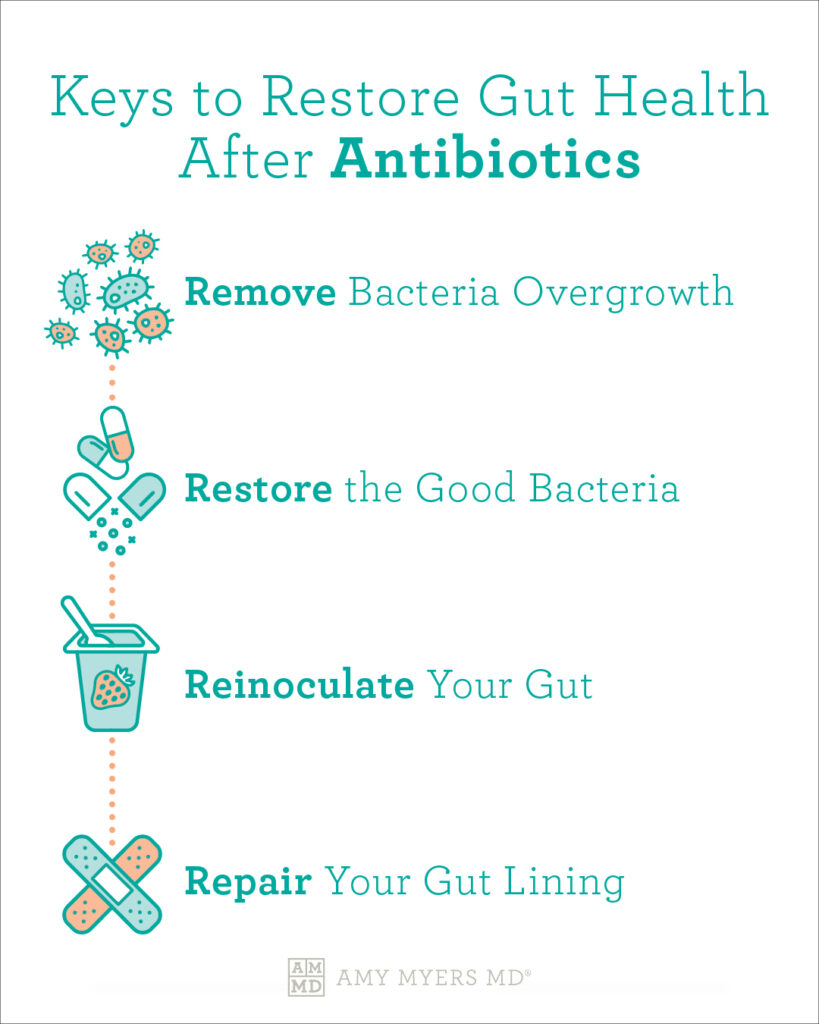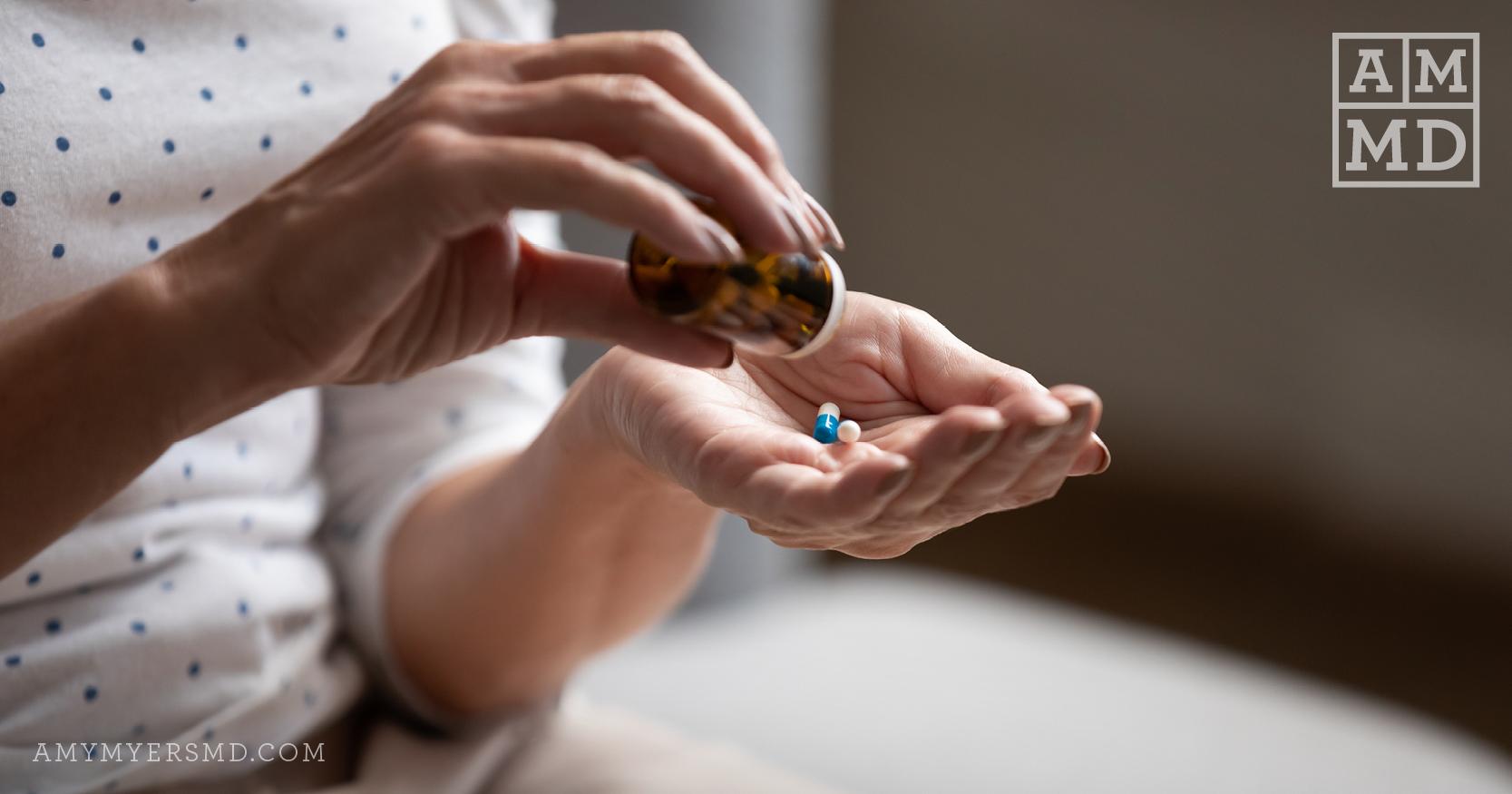If you’ve ever taken a round of antibiotics to fight an infection, you are not alone! While antibiotics are sometimes unavoidable, nearly 50% of the antibiotics prescribed are unnecessary and do more harm than good.1
Antibiotics are the most commonly prescribed medication in the United States. I recommend that no one use antibiotics unless absolutely necessary because they suppress your immune system and disrupt the balance between the good and bad bacteria.
I understand that taking antibiotics may sometimes be unavoidable. Restoring your gut health after a cycle of antibiotics is critical to maintain and achieve optimal health!
Your Gut’s Thriving Ecosystem
Your gut microbiome is its own ecosystem, a biological community of interacting organisms that live in harmony with one another. I like to think of the gut microbiome as a rainforest with many different species living together. When one species gets out of balance in the rainforest, everything gets out of control. When the balance gets disrupted, the good or beneficial plants begin to die and the bad ones start to take over.
Your gut microbiome works the same way. It’s home to 100 trillion microorganisms, including at least 400 different species of bacteria. These microbes in your gut play crucial roles in digestion, immunity, metabolism, and mood. Ideally, all these microbes live in a balanced state. However, when the balance is thrown off, and the bad bacteria begins to over take the good bacteria it can keep all of your systems from working optimally.
Too few or too many microorganisms can cause an array of issues in your gut such as leaky gut, SIBO, or Candida overgrowth, which are precursors to autoimmune disease among other troubling issues and uncomfortable symptoms. I’ll talk more about these later.
What’s more, 60% to 80% of your immune system is located in your gut, along with 90% of the neurotransmitters that help regulate your mood. Even just one cycle of antibiotics can throw off the microbiome balance in your gut. Don’t worry. The empowering part is that all of this is in YOUR control. Let’s talk about how antibiotics can disrupt your gut’s ecosystem.
Antibiotics and Gut Health: What Goes Wrong?
Antibiotics have one job: kill bacteria and stop them from multiplying. However, this simple task is what leads to a disruption in your gut microbiome.
Antibiotics cannot tell the difference between good bacteria and bad bacteria. Their job is to simply go to your gut and kill bacteria. They don’t discriminate between the good and bad.
When antibiotics enter your system and kill off bacteria seemingly at random, your balance of good and bad bacteria can be thrown out of wack. This is a major issue as the good bacteria in your system play a vital role in protecting you from issues such as SIBO or Candida overgrowth. As the number of good bacteria in your gut decreases, you become susceptible to overgrowths of other organisms, including a yeast (or fungus) called Candida.
While a small amount of yeast is normal and necessary, Candida is opportunistic. If given the chance, such as antibiotic usage killing off protective good bacteria, it will grow and multiply quickly — especially when it’s fed sugar, carbohydrates, or alcohol. When yeast starts to multiply, it can damage the lining of your intestinal walls. This leads to increased intestinal permeability and what’s known as leaky gut.
Another symptom of an unbalanced gut is small intestinal bacterial overgrowth, or SIBO. When your gut flora are out of balance, the bacteria normally found in the large intestine and colon overgrow and colonize in your small intestine. This can lead to symptoms ranging from digestive imbalance to chronic illness and autoimmune conditions. This is why it is important to restore your gut health after you take antibiotics.
Antibiotics and Autoimmunity
Antibiotics wipe out anything in your gut microbiome on their quest to kill bacteria. This can cause your gut microbiome to be out of balance, also known as dysbiosis. As the dysbiosis gets more out of control it can suppress in your immune system – remember 80% of your immune system is in the gut – which then can lead to being susceptible to other infections that may require more antibiotics and the cycle just keeps going.
Over time, having this dysbiosis in your gut microbiome will eventually lead to a leaky gut. If your gut is leaky, food particles, toxins, and infections can get through your intestinal lining and into your bloodstream where your immune system detects them as foreign invaders and goes on high alert, attacking them and creating inflammation,
Keeping your gut healthy by avoiding antibiotics isn’t always as simple as avoiding prescription pills. Antibiotics can get into your gut through the food you eat due to modern farming practices. Animals, like people, carry bacteria in their gut. Farmers use antibiotics to stop the spread of bacteria to other animals and stimulate growth. Those antibiotics stay in the muscle, fat and other tissue of the animal and are passed along to you when you eat them.
The only way to ensure the food you eat is free of genetically modified organisms (GMOs) and antibiotics, is to buy certified organic meats, fruits, and vegetables. I understand that it can be expensive to buy all organic food. At the very least, you should buy organic meat.
How to Restore Gut Health While Taking Antibiotics
Avoiding antibiotics altogether is the easiest way to ensure antibiotics don’t disrupt your gut microbiome. However, a severe infection can make taking them unavoidable and you will need to take steps to proactively restore your gut health and combat the effects of the antibiotics.
Something to note is that antibiotics should never be used to treat sinus infection or some ear infections because most of the time they are viral infections and not bacterial.2 Viral infections are caused by viruses and typically last 10-14 days. Bacterial infections are “secondary infections” usually caused by a virus. If symptoms such as a runny nose lasts longer than 14 days or you have a fever that gets worse, it’s likely due to a bacterial infection.
 Dr. Amy Myers
August 16th, 2021
https://content.amymyersmd.com/article/antibiotics-gut/Keys To Restore Gut Health After Antibiotics – Infographics – Amy Myers MD®
Dr. Amy Myers
August 16th, 2021
https://content.amymyersmd.com/article/antibiotics-gut/Keys To Restore Gut Health After Antibiotics – Infographics – Amy Myers MD®Use High-Quality Probiotics with Antibiotics
Probiotics work to restore your gut health by re-establishing the good bacteria. If you are taking antibiotics, I recommend taking 100 Billion Probiotics at the same time or immediately after a cycle of antibiotics.
The best probiotic to take with antibiotics is one with a high number of colony-forming units (CFUs) to ensure you can rebuild that strong population of good bacteria that may be killed off by antibiotics. If you have SIBO, I recommend taking a soil-based probiotic that’s free from the lactic acid that can make your SIBO symptoms worse.
When taking probiotics with antibiotics, it is important to wait at least two hours after consuming the antibiotics to take the probiotics. You should begin taking the probiotics the day that you begin antibiotics, and continue for a couple of weeks after the antibiotic course is through.
Add Gut Repairing Supplements to Your Routine
Collagen does more than just improve your hair, skin, and nails. It also plays a role in restoring gut health. This is because collagen makes up the villi of your small intestine. Your villi are like tiny little fingers that grab nutrients and move them into your bloodstream. They vastly increase the surface area of your gut, making it easier for your body to absorb nutrients. Taking a collagen supplement will help restore your gut lining, nurture your villi, and ward off leaky gut.
Supplementing with Leaky Gut Revive® is another great way to protect your gut. Leaky Gut Revive® combats the root cause of leaky gut by fortifying your gut and keeping your microflora in balance. Using it in conjunction with collagen will provide a one-two punch of protection against harm to your gut from antibiotics.
How to Balance Your Gut Microbiome
Now I’ll tell you about another secret weapon I recommend everyone consider when dealing with an unbalanced microbiome. Microb-Clear® is a cutting-edge blend of botanical extracts, minerals, and fatty acids that create a favorable environment for beneficial bacteria that could have been killed with antibiotics. It also creates an inhospitable environment for microorganisms that have become dysbiotic or imbalanced.
Most bacteria do not live alone, they live in communities. These communities, called biofilms, adhere to surfaces and tend to be multiple species of organisms, commonly bacteria and fungi. Inside the biofilm community, bacteria share nutrients, and even DNA, while undergoing changes to evade your immune system. As a whole, the biofilm can sustain itself with less oxygen and fewer nutrients than individual bacteria — great for the bad guys, not great for us! The biofilm is more resistant to antibiotics, forming a physical barrier that even cloaks the bad bacteria from being detected by immune cells.
This is why I custom-formulated Microb-Clear® with top-of-the-line botanical ingredients that labs across the globe recommend to support optimal digestive health. The “biofilm disruptors” in Microb-Clear® are your first line of defense against dangerous biofilms. You need to break down the biofilm, disrupt the bad bacteria within, and clear out the leftover matrix, minerals, and DNA. Biofilm disruptors help accomplish that — which is why I included the very best in Microb-Clear®.
With biofilms cleared out and an optimal balance of microorganisms in the gut, you are supporting your immune system. I mentioned earlier that 80% of your immune system is headquartered in your gut, and 90% of your neurotransmitters, such as serotonin, are also produced there! By supporting optimal microbiome and gut health with Microb-Clear®, you are setting the stage for optimal health!
It’s not always possible to avoid antibiotics, however, you can take your health into your hands and restore your gut health. Keeping a healthy balance of bacteria is crucial to restore gut health and get on the path to optimal health.
FAQs About Restoring Gut Health
How can I restore my gut health?
How can I restore my gut health?
The best way to restore gut health is to follow the 4R approach: Remove the bad, restore the good, reinoculate the good bacteria, and repair your gut with Leaky Gut Revive®, Collagen Protein and Complete Enzymes
What foods can restore gut health?
What foods can restore gut health?
Foods such as dark chocolate, ginger, garlic, and brussels sprouts are great foods to eat to help you restore your gut health. Eating a diet rich in organic fruits and vegetables, grass-fed and wild-caught protein is also great for keeping your gut healthy.
How long does it take to restore gut health?
How long does it take to restore gut health?
The best way to restore gut health is to avoid damage to your gut in the first place.
Article Sources
- CDC: 1 in 3 antibiotic prescriptions unnecessary. Centers of Disease Control. 2016.
- Be Antibiotics Aware: Smart Use, Best Care. Centers of Disease Control. 2020.
